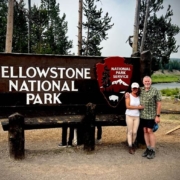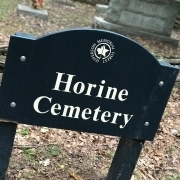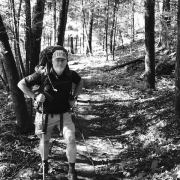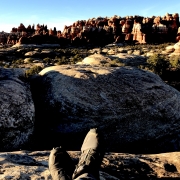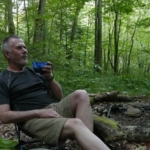How to Find Your Voice | Healthy Aging Series: S11 E17
My very first trip out west was in January 1979. I was headed to college in Portland, Oregon. I was raised around a little snow in Southern Indiana, but I know it’s not Minnesota or the Rockies.
I’d recently been discharged from the Air Force in September, spent six weeks visiting my parents in Southern Indiana, purchased a bright orange Pinto station wagon from my father, and then for six weeks, stayed in Denver with in-laws.
Do not get all uppity thinking, Pintos are barely cars. Yeah, some were death traps, but actually they were pretty reliable. Years later, we drove a smaller 1976 Pinto cross-country from Oregon to Massachusetts to Indiana down to Amarillo, and up through Colorado Springs. All without air-conditioning during July 1981.
On that first trip, we experienced two days of snow. And wind. And snow. And Wyoming, Utah, Idaho and eastern Oregon. I had snow fatigue. Of course, we didn’t have smart phones with weather apps. I’m not sure what we had. No Internet. A car radio and that’s it.
We did have a Rand Nally atlas and I could see a place in Oregon close to the Cascade Mountains called Deadman’s Pass. This section of highway is about 50 miles long, going northwest from Pendleton to Lagrange and is like a perpetual blizzard with high winds, packed ice, and freezing rain. After spending a restful night in Baker City, and watching the local weather on the TV in the Red Roof Inn, we decided to visit a tire shop and purchase some chains. Just having them in the car relieved my anxiety, a little. We ate breakfast and headed towards Deadman’s Pass.
You know that feeling you get when the rear end of your car starts to lose traction around sharp curves? Awful. It’s awful. So, I decided to put on the tire chains. There wasn’t YouTube back then to walk you through the process of putting on tire chains. Only a set of instructions in the package. Lay the chains flat out on the road in front of the tires. Drive over them. Wrap them around the tire and connect the loose ends.
Of course, being Oregon, it started to rain. I’m wearing a suede leather coat that I had custom-made in Korea while stationed there in the Air Force. I followed the instructions, but couldn’t bring the ends together. I would reposition the Pinto over the chain and try again.
The shoulder of the road was covered with packed snow and after 45 minutes of shuffling around the car, my feet were wet and cold, my hands were wet and cold, and I was wet and cold. And, no chains on the tires on the third and fourth try.
Then, I looked behind me and there was an Oregon State Trooper pulling up with lights on. “What’s going on question” he asked. “I’m trying to get these chains on my tires. I heard it was going to get worse as we approach Deadman’s pass. I’ve never done this before and I’m having a little trouble getting them on.”
The trooper looked up, smiled, and pointed west, and said, “Well you’re not going to need them. About a mile or a mile and a half up the road things clear up. Then it’s clear driving for the next 250 miles to Portland.”
I thanked him, threw the chains in the back of the Ford Pinto, and drove the last seven hours through the Columbia River Gorge to Portland.
FYI: when I took a closer look at the chains, the tire shop had sold me the wrong size chains.
I’ve been to many states, parks, mountains, and deserts over these past 40 years since that trip.
I’ve learned a lot, but I still wonder if I could put chains on my car.
But I also think I’m wiser than I was as a 22 year-old new veteran.
There’s a Folk Tale that speaks about the issue of traveling. It doesn’t give any advice about putting chains on your tires, but it does have some excellent advice about living.
In Grimm’s Fairy Tales, it’s titled “Going a Traveling.”
I’ll share it in its entirety (Wikipedia):
A long, long time ago there lived a mother and her son. The son told the mother that he wanted to go out a traveling. The mother was very worried about it since they were very poor. The son told her that he would be fine, and he would always say “not much.”
One day on his travels, he passed by a group of fishermen while he was saying “not much.” The fishermen could not catch any fish and were very angry at him. He asked them what he should be saying instead. They told him to say “Get it full.”
He continued to say “get it full, get it full” while he was traveling. Then he passed by a gallows when some prisoners were being hung. The executioner got angry and said, “so it is good to have more criminals?” The young man asked what he should be saying instead. The executioner told him to say “God, please have pity on the poor soul.”
Then he came across a group of knackers, men who cleaned up animal carcasses, who were skinning a horse while he was saying “God, please have pity on the poor soul.” The knackers got mad and told him to say “there lies the dead flesh in the pit.”
So the young man kept on traveling while he was saying “there lies the dead flesh in the pit.” A cart passed by and fell into a pit. The people in the cart were mad and start attacking the young man. He ran back home and never went out a traveling again in his life.
The sentence that jumps out to me throughout this Folk Tale is the youth asking several times, “What should I say, then?”
This Fairy Tale makes a point to indicate that the woman and her son were very poor and lacked the resources for him to travel. Traveling, or living, requires a basic income in order to thrive in this world.
Poverty of Thought
But I think that there was an equally disabling deficit that he had, that I’m calling, “Poverty of Thought.”
I was always struck with that phrase coming from the Diagnostic and Statistical Manual regarding some forms of mental illness.
I think in this sense, poverty of thought means not having a voice. Speaking really is simply thinking out loud. His poverty was not having anything to say. Not having a voice. Mimicking others.
Traveling. Exploring. Engaging. Responding. Relating. Changing. Exchanging. Pursuing. Caring. Loving. In other words living, requires you to have a voice. It requires you to have your voice. You cannot go through life sounding like someone else.
Finding Your Voice
Why is finding your voice so important for navigating this world? Because it’s impossible to leave home without your voice. Everyone needs to leave home. Everyone needs to leave behind the voices of your parents and the voices that you grew up hearing. All of those voices are important, but they will keep you from making your new home.
We spend 30 years listening to other’s voices and then the next 30 years silencing them as we become our authentic selves.
Finding our voice creates inner stability. It creates a focus and maybe even a purpose. It prevents us from wandering from place to place. It changes us from being a vagabond to a pilgrim. Having a voice is equivalent to competency. Having a voice helps you know what to say and when to say it. It helps you be the right person in every situation you find yourself in.
Having a voice gives you confidence to take risk, to travel, not naïvely, like the man in the Tale, but wisely.
Having a voice means knowing not only what to say, but what to do when you leave home.
How do you find your voice?
There’s no easy way. There aren’t any PowerPoints with 10 steps or bullet points to guide you.
I think finding your voice is similar to learning how to run a marathon.
You can read books or subscribe to a training app, but eventually you have to get off the couch and put one foot in front of the other and run.
You might start jogging.
You might jog a mile, then two, and then five.
You might start doing hill repeats and sprints.
You might go to a track and time yourself and eventually, you run the race.
Finding your voice is similar.
You start by using your voice and telling people what you think. Not what others think, but what do you think.
What do you really think about things?
What do you like and dislike?
Sometimes, that simple question can define who you are and give you a voice, your voice.
Finding your voice doesn’t give you a license to be rude.
Finding your voice doesn’t mean that you don’t listen to others.
Finding your voice means that the world gets to hear what you think, and what you hope, and what you want for those that you love.
Finding your voice means that the world will become a chorus.
A chorus that includes your ideas, and your dreams, and your solutions in a world that pulls us all towards uniformity and monotony.
Use your voice. Share your voice.
As you travel this formidable world.

